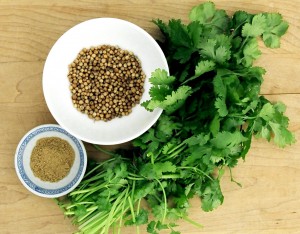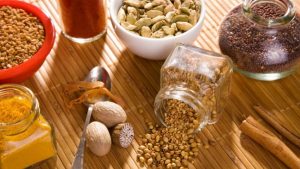Coriander is one of those rare spices that we seem to use equally in seed, powder, or plant form. It is used both fresh and dry and is a popular garnish on dishes. The fresh form is sold in grocery stores as cilantro.
Indians know this herb as dhanya and it’s a staple in any masala box. According to Ayurveda, the rasa or initial taste of coriander is astringent. It then creates a sweet taste as it’s digested. Coriander is fine for all three Ayurvedic body typeds to use and it does not provoke Pitta, unlike many other spices. Its Latin name is Coriandrum Sativum and it derives from the same family as cumin.
Coriander is a source of Vitamins B, C, & K, phosphorus, calcium, magnesium, iron, phytonutrients, and flavonoids. Additionally, this herb assists with digestion. It relieves intestinal gas, prevents nausea, and stimulates normal appetite. This spice is a mild diuretic and contains anti-histamines. Add cilantro or coriander as a seasoning while cooking, not while sautéing.

Coriander promotes proper functioning of the liver. As a beneficial source of dietary fiber, it facilitates bowel movements. This potent herb also protects against urinary tract infections, since it a urinary alkaline. Additionally, it promotes proper functioning of the liver. As a beneficial source of dietary fiber, it facilitates bowel movements.
Researchers in Portugal found that oil extracted from coriander seeds can kill bacteria such as E. coli, which are related to food-borne diseases. This spice also has anti-fungal properties. Natural compounds in coriander leaves remove toxic heavy metals from the body without any side effects.
Coriander is known to lower blood sugar by stimulating the secretion of insulin. It helps the heart by lowering bad cholesterol (LDL) and raising good cholesterol (HDL). This herb also works on the heart chakra.
 Furthermore, coriander works on the nervous system and it can stimulate the memory. It is also beneficial for healing skin problems such as eczema, pimples, and blackheads.
Furthermore, coriander works on the nervous system and it can stimulate the memory. It is also beneficial for healing skin problems such as eczema, pimples, and blackheads.
Cilantro and coriander may be used to treat a multitude of common ailments:
- For skin rashes, apply cilantro juice topically. Or mix ½ tsp of coriander powder and 1 tsp organic sugar in 1 cup of water and drink.
- For nausea and dysentery, take 1 cup of fresh buttermilk and add 1-2 two teaspoons of coriander juice. Dry coriander is used in the treatment of diarrhea.
- For heavy menstrual flow, boil 1.5 tsp of coriander seeds in 17 oz (½ liter) of water. Then add ½ tsp of organic sugar, and drink while warm.
- For people with arthritis, coriander has many anti-inflammatory properties. Boil ground coriander seeds with water, strain, and drink.
- For heavy metal toxicity, drink cilantro juice and apply pressed cilantro to the skin topically.
- For a burning sensation in the body, soak 1 tsp of coriander seeds in a glass of water overnight, strain, and drink in the morning.
 For burning urination, soak 1 tsp of coriander powder or coriander seeds in a glass of water overnight, strain, add 1 tsp organic sugar, and drink in the morning. Or boil 1 tsp of coriander seeds in hot water, steep 10 minutes, strain, and drink.
For burning urination, soak 1 tsp of coriander powder or coriander seeds in a glass of water overnight, strain, add 1 tsp organic sugar, and drink in the morning. Or boil 1 tsp of coriander seeds in hot water, steep 10 minutes, strain, and drink.- For a digestive drink for all body types, make cumin, coriander, and fennel tea and drink with meals.
- For excessive thirst caused by a fever, boil 1 tsp of coriander powder in 1 cup of water, cool and drink.
If you have bronchial asthma or chronic bronchitis, be mindful in your use of dry coriander, as it may aggravate the situation. Please consult your health care practitioner for advice on how to best incorporate natural healing modalities into your life.
Try coriander in seed or powder form or cilantro in either fresh or dry form and see how it can add some spice to your favorite dishes!